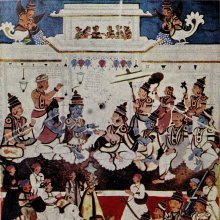Appayyadikshita, Appayya-dikshita, Appayyadīkṣita: 4 definitions
Introduction:
Appayyadikshita means something in Hinduism, Sanskrit. If you want to know the exact meaning, history, etymology or English translation of this term then check out the descriptions on this page. Add your comment or reference to a book if you want to contribute to this summary article.
The Sanskrit term Appayyadīkṣita can be transliterated into English as Appayyadiksita or Appayyadikshita, using the IAST transliteration scheme (?).
Images (photo gallery)
In Hinduism
Vedanta (school of philosophy)
Source: Hindupedia: Later AdvaitinsA great Advaitin and Shiva-bhakta from the Tamil region, Appayya Dīkṣita (16th century CE) authored several works on Vedānta, Mīmāṃsā and Nyāya, including:
- Siddhāntaleśasaṃgraha: An independent prakarana-grantha on Advaita-Vedānta.
- Parimala: A sub-commentary on Amalānanda's Kalpataru.
- Madhva-tantra-mukha-mardanam (with its commentary the Vidhvaṃśana): A polemical text addressing the Madhva school.
- Śivārkamaṇidīpikā: A commentary on the Brahmasūtra Bhāṣya of Śrīkaṇṭha Śivācārya.
- Śivādvaitanirṇaya and Śivatattvaviveka: Texts reconciling the Śivādvaita-Vedānta philosophy of Śrīkaṇṭha Śivācārya with Advaita-Vedānta.

Vedanta (वेदान्त, vedānta) refers to a school of orthodox Hindu philosophy (astika), drawing its subject-matter from the Upanishads. There are a number of sub-schools of Vedanta, however all of them expound on the basic teaching of the ultimate reality (brahman) and liberation (moksha) of the individual soul (atman).
Purana and Itihasa (epic history)
Source: archive.org: Puranic EncyclopediaAppayyadīkṣita (अप्पय्यदीक्षित).—A reputed Rhetorician in Sanskrit, who thrived in the 16th Century A.D. He wrote two treatises on rhetoric, the Kuvalayānanda and Citramīmāṃsā. The former is an interpretation of chapter 5 of Jayadeva’s Candrāloka and is very popularin South India.

The Purana (पुराण, purāṇas) refers to Sanskrit literature preserving ancient India’s vast cultural history, including historical legends, religious ceremonies, various arts and sciences. The eighteen mahapuranas total over 400,000 shlokas (metrical couplets) and date to at least several centuries BCE.
Languages of India and abroad
Sanskrit dictionary
Source: Cologne Digital Sanskrit Dictionaries: Aufrecht Catalogus CatalogorumAppayya dīkṣita (अप्पय्य दीक्षित) as mentioned in Aufrecht’s Catalogus Catalogorum:—son of Raṅgarāja Dīkṣita or Raṅgarājādhvarin, guru of Dharmayya Dīkṣita, brother of Apyodikṣita, uncle of Nārāyaṇa Dīkṣita (Nīlakaṇṭhacampū 1637), nephew on mother’s side of Tātayajvan Karṇāṭabhūbhṛdguru. End of 15th century:
Appayyadīkṣita (अप्पय्यदीक्षित):—appayya dīkṣita son of Raṅgarāja Dīkṣita or Raṅgarājādhvarin, guru of Dharmayya Dīkṣita, brother of Apyodikṣita, uncle of Nārāyaṇa Dīkṣita (Nīlakaṇṭhacampū 1637), nephew on mother’s side of Tātayajvan Karṇāṭabhūbhṛdguru. End of 15th century: Advaitanirṇaya. Oppert. 1740. 1741. Adhikaraṇamālā. [Mackenzie Collection] 143. Amarakośavyākhyā (?). Oppert. 7820. Ātmārpaṇastuti or Śivapañcāśikā. Ānandalaharīṭīkā. Burnell. 96^a. Upakramaparākrama mīm. Kuvalayānanda alaṃk. written by request of Veṅkaṭa, king of Vijayanagara. Caturmatasārasaṃgraha or Nayamaṇimañjarī, vedānta. Candrakalāstuti. Burnell. 200^b. Citramīmāṃsā alaṃk. Jayollāsanidhi. [Mackenzie Collection] 13. Tattvamuktāvali vedānta. Oppert. Ii, 8030. Taptamudrākhaṇḍana. Rice. 324. Taptamudrāṅkanakhaṇḍana. Oppert. Ii, 7382. Tiṅantaśeṣasaṃgraha [grammatical] Oppert. 4096. Daśakumāracaritasaṃgraha. Kāvyamālā 1, 91. Dharmamīmāṃsāparibhāṣā L. 2836. Nakṣatramālā. See Vāda^0. Nakṣatravādāvalī, probably, the same as the Vādanakṣatramālikā. Nayamayūkhamālikā. Nāmasaṃgrahamālā lex. W. p. 225. Ben. 33. Nyāyarakṣāmaṇi. See Śārīraka^0. Pañcagranthī vedānta. Pañcaratnastava. Oppert. Ii, 7282. Pañcasvarāvivṛti jy. L. 1478. Np. V, 90. Ix, 60. Pādukāsahasraṭīkā. Rice. 232. Prabodhacandrodayaṭīkā. Taylor. 1, 222. Oppert. Ii, 2070. 3712. Brahmatarkastava and its vivaraṇa. Bhaktiśataka. Mentioned in Kāvyamālā 1, 91. Bhāratatātparyasaṃgraha. Madhvamatakhaṇḍana. Oppert. Ii, 9184. 9416. Madhvamukhamardana and its—[commentary] Madhvamatavidhvaṃsana. Yādavābhyudayaṭīkā. Oppert. Ii, 2760. Rice. 238. Ratnatrayaparīkṣā. Rasikarañjinī, a —[commentary] on the Kuvalayānanda. Burnell. 55^b. Rāmānujamatakhaṇḍana. Oppert. Ii, 9419. Rāmāyaṇatātparyanirṇaya. Oppert. Ii, 4884. Rāmāyaṇatātparyasaṃgraha. Oppert. Ii, 5411. 9979. 10355. Rāmāyaṇabhāratasārasaṃgraha. Oppert. Ii, 8336. Rāmāyaṇasāra. K. 30. Taylor. 1, 177. Rāmāyaṇasārasaṃgraha. Oppert. Ii, 7286. Rāmāyaṇasārastava. Mentioned Kāvyamālā 1, 91 Varadarājastava or Varadarājaśataka. Vasumatīcitrasenāvilāsanāṭaka. Mysore. 1. Vādanakṣatramālikā, vedānta. Vidhirasāyana and its—[commentary] Vidhirasāyanasukhopajīvinī. Viṣṇutattvarahasya. Oppert. 4887. Vīraśaiva. Mentioned Kāvyamālā 1, 91. Vṛttivārttika alaṃk. K. 104. Report. Xvii. Bhr. 16. Vedāntakalpataruparimala. Vairāgyaśataka. L. 2891. B. 2, 108. Śāntistava. Oppert. Ii, 7295, Śārīrakanyāyarakṣāmaṇi. Śāstrasiddhāntaleśasaṃgraha, shorter: Siddhāntaleśasaṃgraha. Śivakarṇāmṛta. Śivatattvaviveka. Śivapurāṇatāmasatvakhaṇḍana. Oppert. Ii, 1195. Śivādityamaṇidīpikā. Śivādvaitanirṇaya. Burnell. 111^a. Śivānandalaharīcandrikā. Oppert. Ii, 10005. Śivārcanacandrikā. Oppert. Ii, 7298. Śivotkarshamañjarī. Oppert. Ii, 10007. Śaivakalpadruma. K. 134. Siddhāntaratnākara (?). Rice. 26. Haṃsasaṃdeśaṭīkā. Rice. 246. Harivaṃśasāracarita. Burnell. 163^a.
2) Appayyadīkṣita (अप्पय्यदीक्षित):—son of Raṅgarāja Dīkṣita, brother of Accādīkṣita, grandson of Ācāryadīkṣita, etc. End of 16th century: Āryāśataka. Pāṇinīyanakṣatramālā. The Rasikarañjinī is by Gaṅgādhara, not by Appayya, as Burnell. has stated.
[Sanskrit to German]
Sanskrit, also spelled संस्कृतम् (saṃskṛtam), is an ancient language of India commonly seen as the grandmother of the Indo-European language family (even English!). Closely allied with Prakrit and Pali, Sanskrit is more exhaustive in both grammar and terms and has the most extensive collection of literature in the world, greatly surpassing its sister-languages Greek and Latin.
See also (Relevant definitions)
Partial matches: Dikshita, Appayya.
Full-text (+118): Dharmayya dikshita, Namasamgrahamala, Ramayanatatparyanirnaya, Mahabharatasarasamgraha, Paniniyavadanakshatramala, Sri Rangarajadhwari, Nayamayukhamalika, Shivadvaitanirnaya, Caturmatasarasamgraha, Dharmamimamsaparibhasha, Tinantasheshasamgraha, Pancaratnastava, Shivapuranatamasatvakhandana, Pancaratnastotra, Ramayanabharatasarasamgraha, Shivotkarshamanjari, Candrakalastuti, Ramayanatatparyasamgrahavivriti, Shivakarnamrita, Dashakumaracaritasamkshepa.
Relevant text
Search found 8 books and stories containing Appayyadikshita, Appayya-dīkṣita, Appayya-dikshita, Appayyadiksita, Appayyadīkṣita, Appayya-diksita; (plurals include: Appayyadikshitas, dīkṣitas, dikshitas, Appayyadiksitas, Appayyadīkṣitas, diksitas). You can also click to the full overview containing English textual excerpts. Below are direct links for the most relevant articles:
Hindu Pluralism (by Elaine M. Fisher)
Hindu Sectarianism: A European Invention? < [Introduction]
The Public Theologians of Early Modern South India < [Chapter 1 - Hindu Sectarianism: Difference in Unity]
The Sectarianization of Classical Knowledge Systems < [Chapter 3 - Constructing Sectarian Identities in Early Modern South India]
Sri Appayya Dikshita < [October – December, 1979]
A Hindu Monotheist < [March-April, 1929]
A Literary Causerie < [October – December, 1996]
Preceptors of Advaita (by T. M. P. Mahadevan)
Alamkaras mentioned by Vamana (by Pratim Bhattacharya)
23: Alaṃkāra-śāstra according to Appayya Dīkṣita (16th Century) < [Chapter 2 - The concept of alaṃkāra in Sanskrit Poetics]
25: Definition of Tulyayogitā Alaṃkāra < [Chapter 4 - Arthālaṃkāras mentioned by Vāmana]
17 : Definition of Krama Alaṃkāra < [Chapter 4 - Arthālaṃkāras mentioned by Vāmana]
Annadatri-carita (study) (by Sarannya V.)
6. Poetic Beauty (b): Alankaras (Aesthetics) < [Chapter 3 - An Introduction to Annadatri-carita]
A History of Indian Philosophy Volume 2 (by Surendranath Dasgupta)
Part 27 - Appaya Dīkṣita (a.d. 1550) < [Chapter XI - The Śaṅkara School of Vedānta (continued)]
Related products

